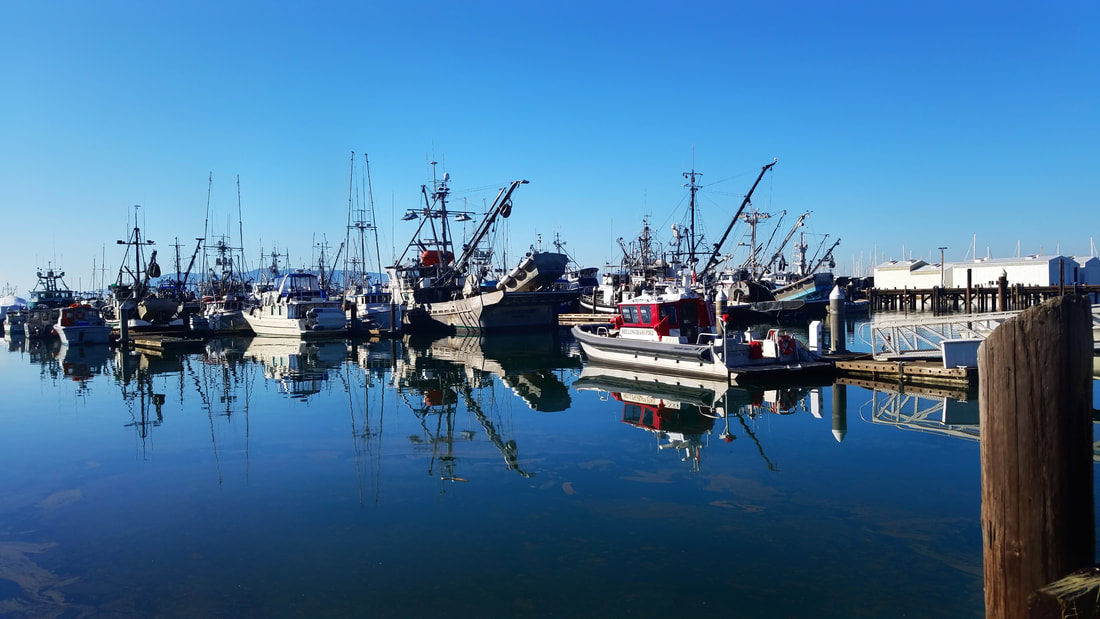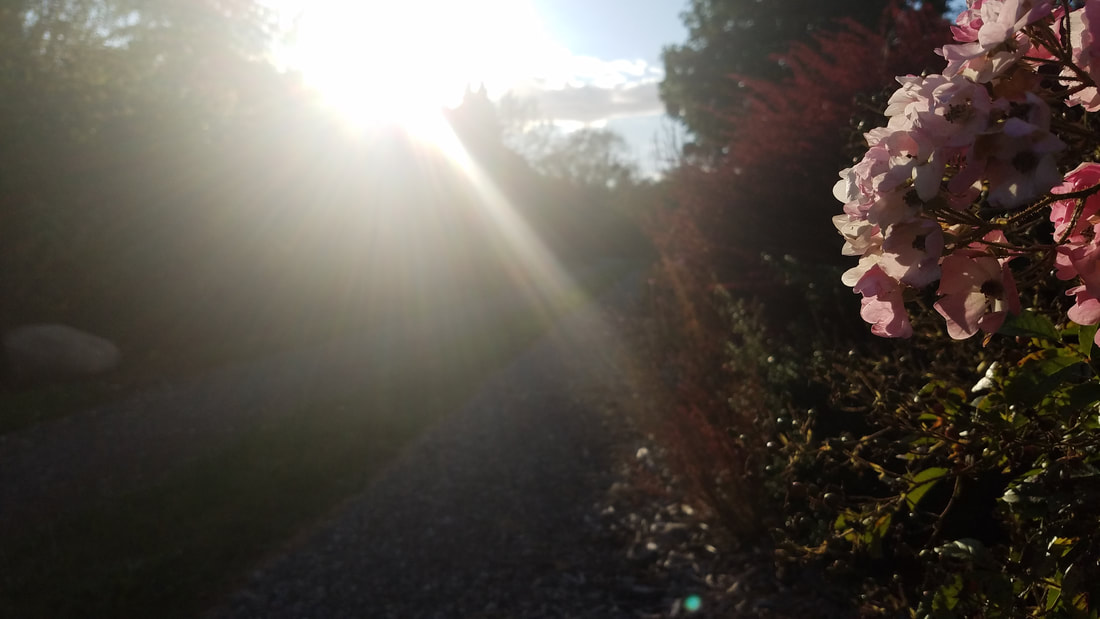|
Melissa and I joined fishermen and tourists and sun-hungry locals on a Saturday date-time this morning, threading our way along the water's edge at Bellingham Bay past high-end establishments and old warehouses. Life is a collision of worlds here where sky and sea and land combine, where the shouts of a warehouseman crash into the silence of unusually still sea air, resting before winter gales. A collision? Maybe it's more like a symphony, a unity of sunshine and cold water, of noise and silence, of gray sheet metal and shiny glass facades. A unity, but not a unison—life here along the shore is a polyphony, a hundred melodies joined in one great song: The little red fire boat sings out "I'll protect" while the fishing boat just beyond intones "I'll provide." The railway behind me announces "I'll carry" and the older couple with their Basset hound, sitting on a bench facing the sea exclaim "I'll enjoy." The sweat of the laboring man and the crab pots and the nets and buoys provide the deep rhythm "I'll work" while the houses on the bluff, peering out at islands across the water simply say "I'll live." That's what we're doing here, Melissa and me. We're living out our own unity. More accurately, we're walking together to build our unity while we're living out this day. Life feels like a collision of worlds much of the time: last night's sleep-over at our house mingles with someone off early to work, others off to town, still another headed to school for driver's education already this Saturday morning... And that's just the beginning. That's just what's going on outside. On the inside, where we live most intensely, we're a hundred ideas and disappointments and longings. Our minds are crowded with the colorful ballads of the past and the anthem, the ethereal song of what we hope life yet may become. Holding hands, we thread our way along the breakwater between yesterday and tomorrow, straining to hear above the caffeinated rhythm of today the unity of that joins many melodies into a symphony, to hear something more than just "I'll work", "I'll protect", "I'll carry", "I'll provide", "I'll enjoy", or even, "I'll live". We have to tune and re-tune our hearing as we walk along the rocky shore where water and sky and land unite. In these quiet moments together, we begin to catch it—at once pure and high and rich and deep, throbbing with power and tender as a mother's caress, a snatch of the Great Song that unites all the songs of all the seasons and all the the ages of life. "I'll love." #1Corinthians13 © Copyright October 2017 by Robert G. Robbins
0 Comments
Are you angered and grieved by the senseless killing in Las Vegas last night? You should be. Justice and mercy demand such a response when bad and evil things befall our fellow men. But that's not all real righteousness requires. In one of the only times Jesus addresses current events during His ministry He speaks to senseless tragedy. "There were some present at that very time who told Him about the Galileans whose blood Pilate had mingled with their sacrifices. And He [Jesus] answered them, 'Do you think that these Galileans were worse sinners than all the other Galileans, because they suffered in this way? No, I tell you; but unless you repent, you will all likewise perish. Or those eighteen on whom the tower in Siloam fell and killed them: do you think that they were worse offenders than all the others who lived in Jerusalem? No, I tell you; but unless you repent, you will all likewise perish.'" Luke 13:1-5 Jesus doesn't end His response with the appropriate anger people justifiably would have felt at Pilate's blood-letting. He doesn't conclude with the wails of mourners grieving the loss of people who were in the path of destruction when the tower fell. Instead, He takes us all the way back to the basic problem: Because sin entered the world in the garden, we live with death and evil and and every kind of catastrophe. The people who suffered in these two headline events were not extreme sinners: They were just sinners like you and me. Jesus presses the point home: Death is coming for everyone; no one is exempt. Tragedy is part of the standard equation in a world under the curse of sin. But rather than advocating a stoic stiff-upper lip or giving a flippant nod of His head to fatalism, Jesus says that the fury and the horror and even the fear should drive us beyond to one thing: Repentance. We are no more righteous than the victims of Pilate's brutality or those on whom the tower fell. We're no better than those senselessly murdered in Las Vegas last night. We're subject to life in a sin-cursed world—but we aren't living for this world. We're living for the world to come where no evil ever gains entrance and where the curse of sin is banished forever. Since nothing evil enters there it only stands to reason that when we taste the salt tears of our fellow men we would tighten our embrace on the death of all our wickedness by clinging to Jesus' cross. That when we encounter human tragedy we would feel afresh the pains of our own need to repent. That repentance which spells death to our sin simultaneously spells life forever. Because Jesus died—because we died with Him—we have the capacity to pour out His rich, red, healing life in deserts of anguish and pain. Speed justice, support the grieving—and walk humbly with God. Repent. © Copyright October 2017 by Robert G. Robbins
|
Archives
October 2017
|


 RSS Feed
RSS Feed